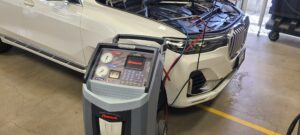
Ducker Carlisle: R1234yf is OEM refrigerant of choice for PHEVs and BEVs
By onMarket Trends
Ducker Carlisle has confirmed that R1234yf is OEMs’ refrigerant of choice in plug-in hybrids (PHEVs) and battery electric vehicles (BEVs).
Ducker Carlisle says it’s time for OEMs to look at other options that provide effective thermal management because it’s critical to battery range and lifespan, such as a CO2 heat pump. Volkswagen reportedly plans to use it on its MEB platform with R744 refrigerant, in part due to an EU proposal to restrict the use of per- and polyfluoroalkyl (PFA) substances.
In July 2023, the differences between recharging R1234yf and R-134a systems were discussed at a Collision Industry Conference (CIC) meeting as both are commonplace in the marketplace. However, an Environmental Protection Agency mandated R-1234yf in 2021 for all new cars. R-134a is being phased out.
In April of this year, the U.S. EPA released updated interim guidance on the destruction and disposal of PFAS, also known as “forever chemicals,” some of which are used by collision repair shops. EPA says they’re found in adhesives, coatings for clothes and furniture, and fire-fighting foam among other widespread use in consumer, commercial, and industrial products. Exposure has been linked to cancers, impacts on the liver and heart, and immune and developmental damage to infants and children, according to the EPA.
VW Group says its transition of all major BEV platforms will take several years through the end of 2030, according to the Ducker Carlisle report.
“At this stage, the strategy of other OEMs remains unclear whether they will make the decision to choose CO2, remain with R1234yf, or opt for other innovative solutions such as propane (R290),” the report states. “The decision depends on multiple factors, including regulations and subsidies, vehicle type (e.g. passenger car vs. bus) and associated safety concerns as well as vehicle size and brand positioning.”
Ducker notes in the report that propane likely won’t be used in passenger cars because of its high flammability. The EPA also doesn’t consider it an alternative under its Clean Air Act, according to the report.
Ducker predicts CO2 will eventually hold a higher market share for passenger vehicles.
“In the next 2-5 years, premium OEMs are highly likely to switch from R1234yf to CO2, or to propane- provided the safety concern related to the flammability of propane has been addressed,” the report states.
Barry Dorn, vice president of Dorn’s Body and Paint, said in August that R-1234yf takes longer to service than R-134a. There are 20 steps to recharge R-1234yf systems including vacuum and leak test time. Research done in Dorn’s shop on the steps to complete the recharge is laid out here.
Images
Featured image provided by Andrew Batenhorst, Pacific BMW
